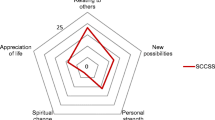Abstract
The present study assessed posttraumatic stress disorder (PTSD) symptoms, psychological distress, and subjective quality of life (QoL) in a group of 43 child Holocaust survivors and a community sample of 44 persons who had not personally experienced the Holocaust. The participants were administered the PTSD-Scale, the SCL-90, and the WHOQOL-Bref. Results showed that the child survivors had higher PTSD symptom scores, higher depression, anxiety, somatization, and anger–hostility scores; and lower physical, psychological, and social QoL than did the comparison group. The findings suggest that the psychological consequences of being a child during the Holocaust can be long lasting.
Similar content being viewed by others
References
American Psychiatric Association. (1987). Diagnostic and statistical manual of psychiatric disorders (3rd ed., Rev.). Washington, DC: Author.
Amir, M., Lev-Wiesel, R. (2001). Does every person have a name? Psychological distress and personal resources among child Holocaust survivors. Journal of Traumatic Stress, 14, 859-869.
Amir, M., Sol, O. (1999). Psychological impact and prevalence of traumatic events in a student sample in Israel: The effect of multiple traumatic events and physical injury. Journal of Traumatic Stress, 12, 139-154.
Breiner, S. J. (1996). Children in and outside the concentration camp. Journal of Psychohistory, 23, 415-426.
Bunk, D., Eggers, C. (1993). Importance of psychodynamic reference factors in psychpathogenesis in persons persecuted by the Nazi regime in childhood. Fortschritte der Neurologie Psychiatrie, 61, 38-45.
Cohen, J. (1988). Statistical power analyses for the behavioral sciences (2nd ed.). Hillsdale, NJ: Lawrence Erlbaum.
Derogatis, L. R. (1977). The SCL-90 Manual F: Scoring, administration and procedures of the SCL-90. Baltimore: John Hopkins University, School of Medicine, Clinical Psychometrics Unit.
Horowitz, M. J., Wilner, N., Kaltreider, N., Alvarez, W. (1980). Signs and symptoms of posttraumatic stress disorder. Achives of General Psychiatry, 37, 85-92.
Krell, R. (1985). Child survivors of the Holocaust—40 years later. Child Psychiatry, 24, 377-412.
Krell, R. (1993). Child survivors of the Holocaust: Strategies of adaptation. Canadian Journal of Psychiatry, 38, 384-389.
Landau, R., Litwin, H. (2000). The effects of extreme early stress in very old age. Journal of Traumatic Stress, 13, 473-487.
Leshem, M. (1999). The long-term effect of participation in the Israeli wars in a nonclinical male sample. Unpublished M.A. thesis, Ben-Gurion University of the Negev, Beer-Sheva, Israel.
Lev-Wiesel, R., Amir, M. (2000). Posttraumatic stress disorder symptoms, psychological distress, personal resources and quality of life in four groups of Holocaust child survivors. Family Process, 39, 445-459.
Mazor, A., Mendelsohn, Y. (1998). Spouse bereavement processes of Holocaust child survivors: Can one differentiate a black frame from a black background? Contemporary Family Therapy: An International Journal, 20, 79-91.
Moskovitz, S., Krell, R. (1990). Child survivors of the Holocaust: Psychological adaptations to survival. Israel Journal of Psychiatry and Related Sciences, 27, 81-91.
Robinson, S., Rapaport-Bar-Sever, M., Rapaport, J. (1994). The present state of people who survived the Holocaust as children. Acta Psychiatrica Scandinavica, 89, 242-245.
Solomon, Z., Ginzburg, K., Neria, Y., Ohry, A. (1995). Coping with war captivity: The role of sensation seeking. European Journal of Personality, 9, 57-70.
Tauber, Y., Van-Der-Hal, E. (1997). Transformation of perception of trauma by child survivors of the Holocaust in group therapy. Journal of Contemporary Psychotherapy, 27, 157-171.
The WHOQOL Group. (1998). The World Health Organization Qol assessment (WHOQOL): Development and general psychometric properties. Social Science and Medicine, 46, 1569-1585.
Author information
Authors and Affiliations
Corresponding author
About this article
Cite this article
Amir, M., Lev-Wiesel, R. Time Does Not Heal All Wounds: Quality of Life and Psychological Distress of People Who Survived the Holocaust as Children 55 Years Later. J Trauma Stress 16, 295–299 (2003). https://doi.org/10.1023/A:1023756326443
Issue Date:
DOI: https://doi.org/10.1023/A:1023756326443



